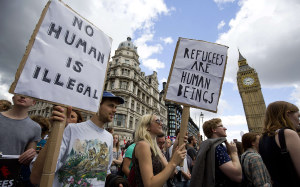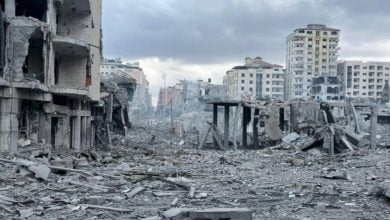
Originally published in Liberation Newspaper, October 2015
More than 100,000 refugees crossed the European Union’s borders in July, followed by another 150,000 in August. The images of the exodus have reflected the horrifying reality: families enduring hunger, despair and separation, confronting the danger of smugglers and the sea, only to then face state repression and dehumanizing camps.
But it has also shown the world once again the determination and fighting spirit of poor and oppressed people. Despite long, dangerous journeys over land and sea, and armed forces telling them to turn around, the refugees have persisted in search of safety and better lives for their families.
That determination was on display at Keleti train station in Budapest, Hungary earlier this month. Hundreds of refugees were at the train station waiting to hop on a train to Austria or Germany as many had already done.
Under a European Union arrangement known as the Schengen agreement, 26 countries agreed to abolish internal border controls creating what is known as the Schengen Area. This operates very much like a single state for international travel purposes, with external border controls for travelers entering and exiting the area and common visas, but with no internal border controls. The Hungary-Serbia border is on the southern edge of the Schengen Area.
The refugees at Keleti train station in Budapest thought, by getting into Hungary, they had already crossed the biggest hurdle. However, all of a sudden the Hungarian government stopped allowing the refugees to board trains heading to Austria or southern Germany. The refugees rightfully responded with anger to the Hungarian police forces. Some refugees were told to “go back home” and others were told they would be placed in special camps inside Hungary until the EU countries decided what to do with them.
Many chanted “Freedom! Freedom!” and “No camps! No camps!” and waved train tickets in the faces of the riot police. For nearly five days the masses of refugees refused to be moved either to a Hungarian camp or back to a previous stage in their journey.
During this time, the 26 EU countries still had come up with no solution for the incoming refugees. Some of the countries with a strong xenophobic rightwing, like Hungary, had taken a cue from the United States and began to build walls and razor wire fences along their borders. Finally, with the standoff about to reach its fifth night and the refugees running out of food, water and patience, the brave women and men of the Keleti train station decided they were going to walk to Austria—over 100 miles away!
With the possibility of hundreds if not thousands planning on marching to Austria, the Hungarian government had no choice but to give in to the demands of the refugees. The government told the people at Keleti train station they would be providing them buses in order to allow them to continue to travel deeper into the EU border-free zone. Many arrived in Germany to crowds of people who welcomed and applauded them for their courage.
EU leaders have struggled to come up with an agreement from the 28 member countries to accept quotas for 120,000 more incoming refugees. In the media, much of the presentation of the problem revolves around the compassion, or lack thereof, of various European governments. What is fundamental, however, is that the refugees themselves—through their own self-sacrifice and heroism—forced the reforms and agreements. While the right to seek asylum already exists on paper, they made it a reality.
Our sisters and brothers, fleeing homelands that have been torn apart by imperialist-backed war, still face many borders and obstacles. However, as Black liberation fighter Assata Shakur once said about her time in jail, “A wall is just a wall. It can be broken down.”






